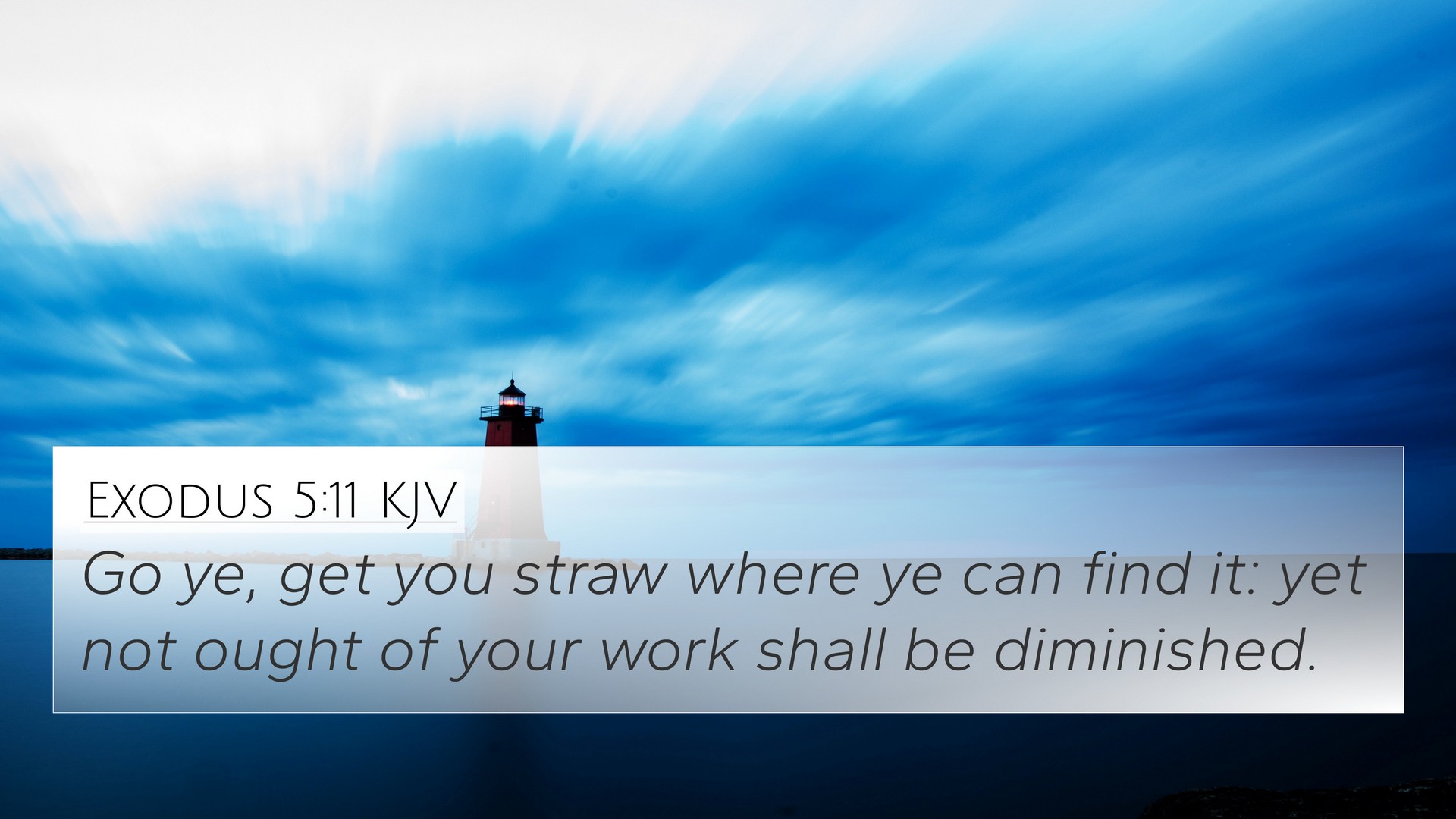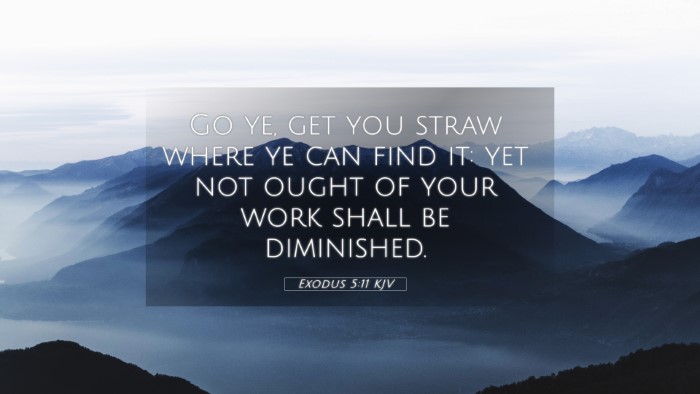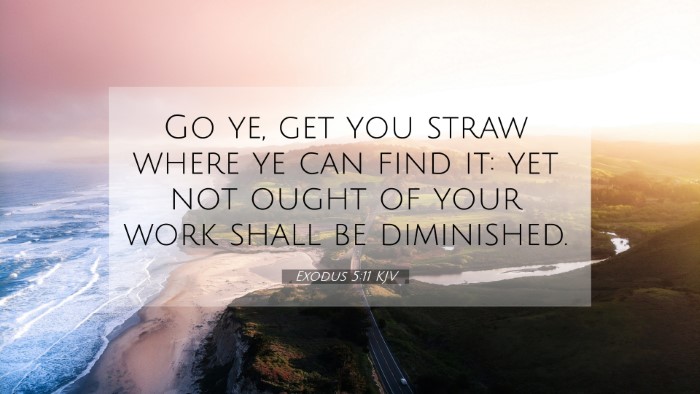Understanding Exodus 5:11
Exodus 5:11 states: "Go, work! For we are not going to give you straw; go, get your own straw where you can find it; yet your work will not be reduced in any way." This verse is part of the account where Pharaoh, in response to the people of Israel's plea for relief, increases their burden instead of granting mercy.
Summary of the Verse
This verse captures the essence of the oppression that the Israelites faced during their time in Egypt. It reflects Pharaoh's hardened heart and his unwillingness to relieve the suffering of the Israelites despite their cries. The demand for the Israelites to gather their own straw, while maintain the same level of productivity, exemplifies the cruelty of their situation.
Commentary Insights
Insights from Matthew Henry
Matthew Henry emphasizes the harshness of Pharaoh's command as a direct response to Moses and Aaron's request for the people to be allowed to worship. He points out how this action represents the way in which tyrants often respond to demands for justice with increased oppression, showcasing Pharaoh's desire to maintain control and authority over the Israelites.
Insights from Albert Barnes
Albert Barnes notes that the command to gather straw independently illustrates the heavy taxation and oppression that the Israelites suffered. He further analyses the significance of straw in brick-making, indicating how vital it was for the laborers' task, and underscores the challenge and despair such a demand would create.
Insights from Adam Clarke
Adam Clarke explains that the Egyptians provided straw as a key component for constructing bricks. By denying the Israelites straw while expecting them to maintain their quota, Pharaoh not only exacerbated their toil but also demonstrated his utter disregard for human suffering. Clarke illuminates the broader implications of this command, seeing it as a reflection of God's eventual deliverance contrasted against the backdrop of oppression.
Bible Verse Cross-References
- Exodus 1:13-14: This passage describes how the Egyptians made the Israelites serve with rigor, paralleling the burdens mentioned in Exodus 5:11.
- Psalm 105:25: This verse speaks to how God turned the Egyptians' hearts to hate His people, further highlighting the struggle of the Israelites.
- Leviticus 25:43: This verse instructs not to rule over others with harshness, contrasting Pharaoh's treatment with God's covenantal principles.
- Isaiah 19:4: This prophecy speaks of God's judgment against Egypt, reflecting God's awareness and eventual intervention in Israel's plight.
- Deuteronomy 26:6: Acknowledges the Israelites' oppression in Egypt, which connects back to the labor demanded in Exodus 5:11.
- Matthew 11:28-30: Offers a form of contrast where Christ invites those who labor and are heavy laden to come to Him for rest, highlighting the burden relief God promises.
- Romans 8:28: This verse reassures believers that God works all things for good—an important reminder for the Israelites amidst their suffering.
- Acts 7:19-20: Stephen recounts the oppression the Israelites faced, linking back to Pharaoh's harshness in Exodus.
- Hebrews 11:24-26: Refers to Moses’ choice to suffer with God’s people instead of enjoying temporary pleasures in Egypt, illustrating the sacrifices made in light of their oppression.
- Revelation 18:20: Points to the ultimate downfall of oppressive nations, echoing the justice God brings to those who suffer unjustly.
Exploring Thematic Connections
This verse demonstrates the theme of oppression and the struggles of God's people, which resonates throughout both the Old and New Testaments. The connections to other verses provide a deeper understanding of God’s commitment to deliver His people from bondage, including spiritual and physical forms of oppression.
Tools for Bible Cross-Referencing
Understanding Exodus 5:11 within the broader context of Scripture involves effective tools for cross-referencing. Here, we explore methods that can enhance your Bible study:
- Bible Concordance: A valuable resource for locating discussions about specific words such as "work" or "burden."
- Bible Cross-Reference Guide: These guides help in identifying links between related verses for a comprehensive study.
- Cross-Reference Bible Study: This method engages users in thematic explorations and links Scriptures that relate to each other.
- How to use Bible cross-references: Engaging with cross-references allows for a deeper understanding of context and meaning.
- Bible Reference Resources: Utilize comprehensive resources including study Bibles, commentaries, and online tools.
Conclusion
Exodus 5:11 serves as a crucial reminder of the suffering endured by God's people in Egypt. Through reflection upon related scriptures, one can appreciate the full narrative of oppression and eventual redemption. This verse invites readers to delve into cross-referencing, understanding thematic connections, and synthesizing insights from public domain commentaries. Such an approach is invaluable in enriching one's study of the Bible and discerning God's overarching plan within the Scriptures.



